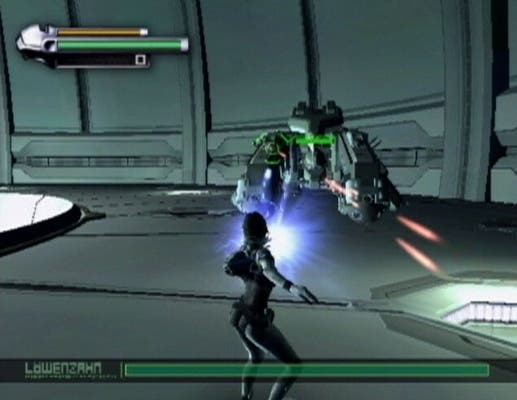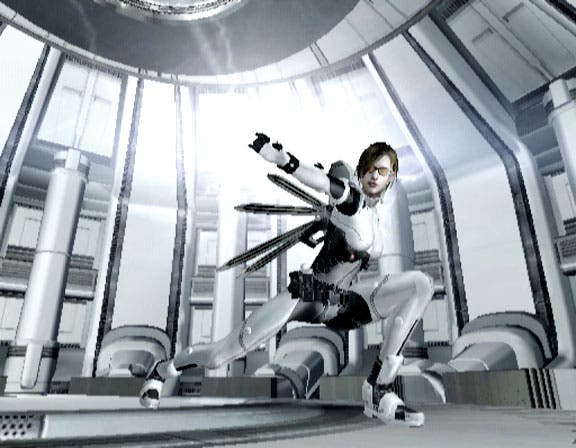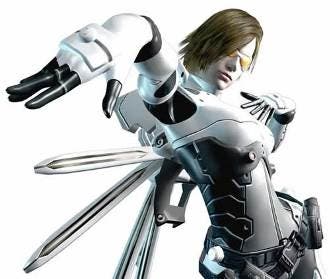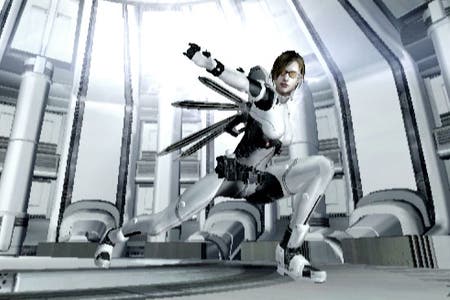Retrospective: P.N.03
Schneider house rules.
The one thing everyone remembers about P.N.03 is that it was the first game in the Capcom Five, the publisher's proposal to prop up the then-ailing GameCube with a set of third-party exclusives. Though the games turned out quite nicely, the plan wasn't exactly a roaring success: Dead Phoenix was canned, while Resident Evil 4, Killer7 and Viewtiful Joe were ported to PlayStation 2. Only P.N.03 remained loyal to the Cube, though that's less a case of a publisher attempting to stick to its guns so much as a total lack of interest in a new version.
Indeed, of Shinji Mikami's seven games as director, P.N.03 is the obvious outcast. Rarely does it earn a mention when the best games on GameCube are discussed; nor does it attract the vociferous cult adoration of the likes of God Hand and Vanquish. Heck, Dead Phoenix is probably more fondly remembered.
In truth, it's quite easy to see why P.N.03 isn't anyone's favourite Mikami joint, because this isn't the most welcoming game ever made. Its challenge is stern, its plot is underdeveloped and its environments are chilly and sterile. And while protagonist Vanessa Z Schneider (the Z is important; without it she sounds a bit like a fortysomething criminal law solicitor) moves like a ballet dancer, she controls like a tank. In most games you're tasked with conquering unforgiving environments or aggressive enemies; in P.N.03, it's the control scheme that proves the biggest obstacle.

Few should be surprised to hear that, because this is a familiar Mikami tactic: he's never been one to make controls immediate or intuitive. In all his games, however, this has always been an unconventional means to a worthwhile end. God Hand wrenched right-stick camera controls from the player's grasp to offer instant access to a range of dodges, while Resident Evil's static camera angles and awkward avatar movement only amplified the sense of player unease, heightening the tension of each escape.
By comparison it's harder, at least initially, to see why the setup here is so wilfully awkward. Shoulder buttons handle sidesteps, while ducks and dodges are executed with a combination of the Y button and the control stick, with X switching between targets. Schneider's special Energy Drive moves, meanwhile, are stuck on the d-pad, requiring a shift in thumb position to trigger them. More problematically, she can't move and shoot at the same time, in what at first seems a stubborn, unwelcome holdover from Resi.
A steep learning curve hardly helps, while tutorials are virtually non-existent (the game can't be bothered to explain the Energy Drive properly, instead asking you to visit the Start menu to read up on how it works). The AI of the robotic enemies you face isn't particularly sophisticated, but they pack quite a punch: in the first facility you enter, you may well be caught unawares by one enemy type which fires a one-hit-kill laser. To further increase the tension, you're forced to finish an entire building before you can save. Use up all your continues trying and you'll have to start again from the entrance.
The key, then, is to use the environment to your advantage. This isn't your average cover shooter, but there are still low walls to duck behind, or vertical pillars to protect you from the onslaught of projectiles. It's not so much stop-and-pop as hide-and-bide: waiting for the right moment to emerge and loose off a few energy blasts from Schneider's palm.

At first it's easier to muddle through, staying out of harm's way and only poking your head up above the parapet when you're certain you won't get a faceful of laser. But eventually you realise that only by venturing out into the open do you stand a chance of a decent score. Remain hidden for too long, and the timer that ticks down from the moment you destroy your first enemy in a room will run out. In other words, you're going to have to be more daring.
To do so, you'll need to acquaint yourself with the jump, dodge and sidestep commands, and figure out the ideal moments to deploy each of them. Which means prioritising targets, memorising attack patterns and only occasionally beating a tactical retreat. It's a long road to mastery, but the first time you instinctively sidestep one attack to the left, duck and slide right to avoid another before releasing the absurdly stylish Swan missile attack - spin, charge, crouch and release! - is when it finally begins to click into place.
Suddenly, there's real grace to Schneider's movements. Ignore the rather ungainly jump animation, and combat becomes an elegant dance between you and your robot opponents. Indeed, there's a strong rhythmic element to encounters, with Schneider's constant head bobbing and foot tapping matching the pulsing techno beats, helping you gauge the timing of incoming attacks.
The very best moments come when you clear out almost every enemy in a room via conventional fire, and then deliver the coup de grâce with an Energy Drive command. That gorgeous arched-back pose, timed to coincide with the missiles hitting their target, is one of gaming's all-time great pieces of showboating, all the more satisfying for the struggle you had to go through to get there.

If P.N.03 is the pariah of Mikami's catalogue, there have been signs since that he's not about to strike it from his CV just yet. The risk-reward element to combat is something Mikami would later explore in Vanquish, this being the more measured, elegant yin to that game's hyperkinetic yang.
There's even a little of its DNA in God Hand, and on occasion I've found myself wondering if P.N.03 would benefit from right-stick dodges. That said, such an adjustment would perhaps smooth off the difficulty curve of a game that is defined by its unconventional challenge. Take that away, and you risk compromising what makes it so unique.
And in the end, it's those curious controls that give P.N.03 the personality it's lacking elsewhere. The story is forgettable, save for a neat twist right at the death, and its look is too clinical to draw in the aesthetically inclined. In other words, it doesn't have the usual hooks that can help propel a game towards cultdom.
Yet if at times its appeal can be hard to pin down, that doesn't mean it should be so easily forgotten. Because the one thing everyone should remember about P.N.03 is that mastering a character's move set can be every bit as satisfying as beating bosses and conquering worlds.









